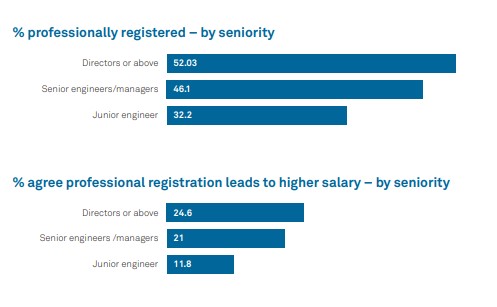The mean average salary for professionally registered respondents is £55,968, whilst it is £45,809 amongst respondents who are not professionally registered. In last year’s survey, the mean average salary for professionally registered respondents is £51,930, whilst it was £43,914 amongst non-registered respondents.

In total, 43 per cent of respondents to The Engineer’s 2018 salary survey said they are professionally registered. This represents an increase on last year’s figures, when 39 per cent of respondents told us they were professionally registered.
In this year’s survey, as with 2018, average salaries were higher amongst professionally registered respondents in every sector. The biggest difference was found amongst engineers coming from the Telecomms/Utilities and Electronics sectors where professional registration accounts for an average difference of almost £18k. There was also a pronounced gap of £13k amongst respondents working in Energy/Renewable and Nuclear sectors.
The smallest average gap was found in the Aerospace sector, where professionally registered respondents earn on average just over £2K more than their unregistered colleagues
Average salaries for professionally registered respondents were also higher at every level of seniority with the exception of Graduate Trainee/Apprentice level engineers where they were more or less equal. The differences were most pronounced at Director level (14k).
Interestingly, of those respondents who are professionally registered only 21 per cent agreed that professional registration had led to a higher salary for them.
Commenting on this year’s findings Alasdair Coates, CEO of UK engineering's regulatory body The Engineering Council said: “Registrants consistently tell us that becoming professionally registered has increased their credibility, helped them gain promotion or win more business. These responses confirm what we saw in the same survey last year, that professional registration may also boost salary, demonstrating that it is an investment in your future.”
Produced in partnership with technical recruitment consultancy CBSbutler, the survey – now in its fifth year – attracted responses from 1,568 engineers from multiple sectors across the UK.





Nanogenerator consumes CO2 to generate electricity
Whoopee, they've solved how to keep a light on but not a lot else.